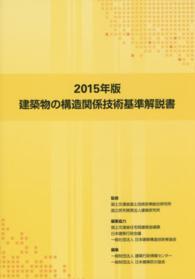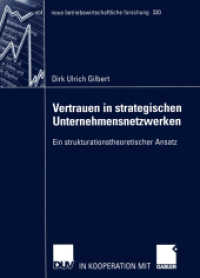- ホーム
- > 洋書
- > 英文書
- > Business / Economics
Full Description
In 2008 Ma Ying-jeou was elected President of Taiwan, and the Kuomintang (KMT) returned to power after eight years of rule by the Democratic Progressive Party (DPP). Since taking power, the KMT has faced serious difficulties, as economic growth has been sluggish, society has been polarised over issues of identity and policy, and rapprochement between Taipei and Beijing has met with suspicion or reservation among large segments of Taiwanese society. Indeed, while improved relations with the United States have bolstered Taiwan's security, warming cross-Strait relations have in turn made Taiwan more dependent upon and vulnerable to an increasingly powerful China.
This book provides a comprehensive analysis of the return of the Kuomintang (KMT) to power, and examines the significant domestic political, economic, social and international challenges and changes that have characterized Taiwan since 2008. It identifies the major domestic, cross-Strait and foreign policy trends, and addresses key issues such as
elections and Taiwan's party system;
the role of the presidency and legislature;
economic development; social movements;
identity politics;
developments in cross-Strait relations;
Taiwan's security environment and national defence policies;
relations with the US and Japan.
In turn, the contributors look towards the final years of Ma's presidency and beyond, and the structural realities - both domestic and external - that will shape Taiwan's future.
Political Changes in Taiwan Under Ma Ying-jeou will be of great interest to students and scholars of Taiwan studies, comparative politics, international relations, and economics. It will also appeal to policy makers working in the field.
Contents
Introduction Part I: Political Developments 1. The Presidential and Legislative Election Dynamics: 2012 vs. 2008 2. Taiwan's Party System in the Ma Ying-jeou Era 3. The Role of the President under Ma Ying-jeou 4. The Role of the Legislative Yuan under Ma Ying-jeou: The Case of China-Policy Legislations and Agreements Part II: Economy and Society 5. Taiwan's Economy in the Shadow of ECFA 6. The Resurgence of Social Movements under the Ma Ying-jeou Government (2008-2012): A Political Opportunity Structure Perspective 7. Revisiting Identity Politics Under Ma Ying-jeou 8. The Impact of Cross-Strait Relations on Taiwanese Society Part III: The Relations Across the Taiwan Strait 9. Reappraisal of President Ma Ying-jeou's Rapprochement Policy in the Taiwan Strait 10. Mainland China's Peaceful Development Strategy On Cross Taiwan Straits Part IV: Security Issues 11. Taiwan's Changing Security Environment 12.Taiwan's National Defense Transformation and US-Taiwan Relations Part V: International Relations and Status 13. U.S.-Taiwan Relations in the First Ma Administration 14. Evolving Practical, not Strategic, Partnership: Japan-Taiwan Relations 2008-2012 15. Taiwan in the International Organizations 16. Taiwan and Soft Power: Competing with China and Seeking Security








